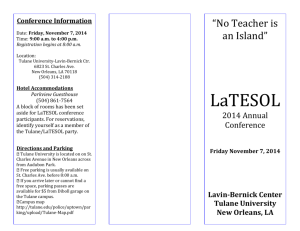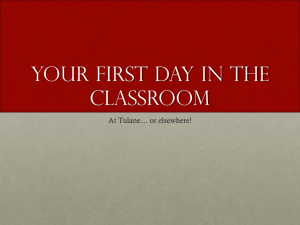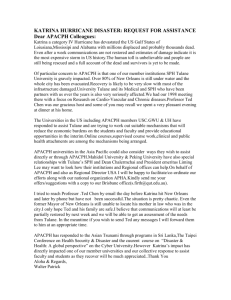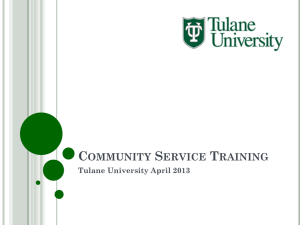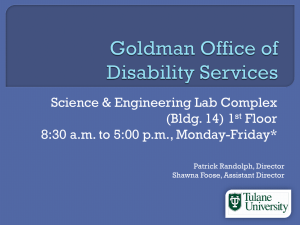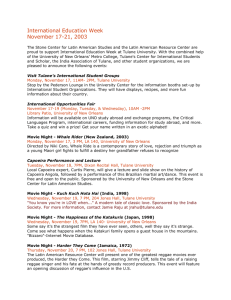Adam's-COLQ2010-01-syllabus
advertisement
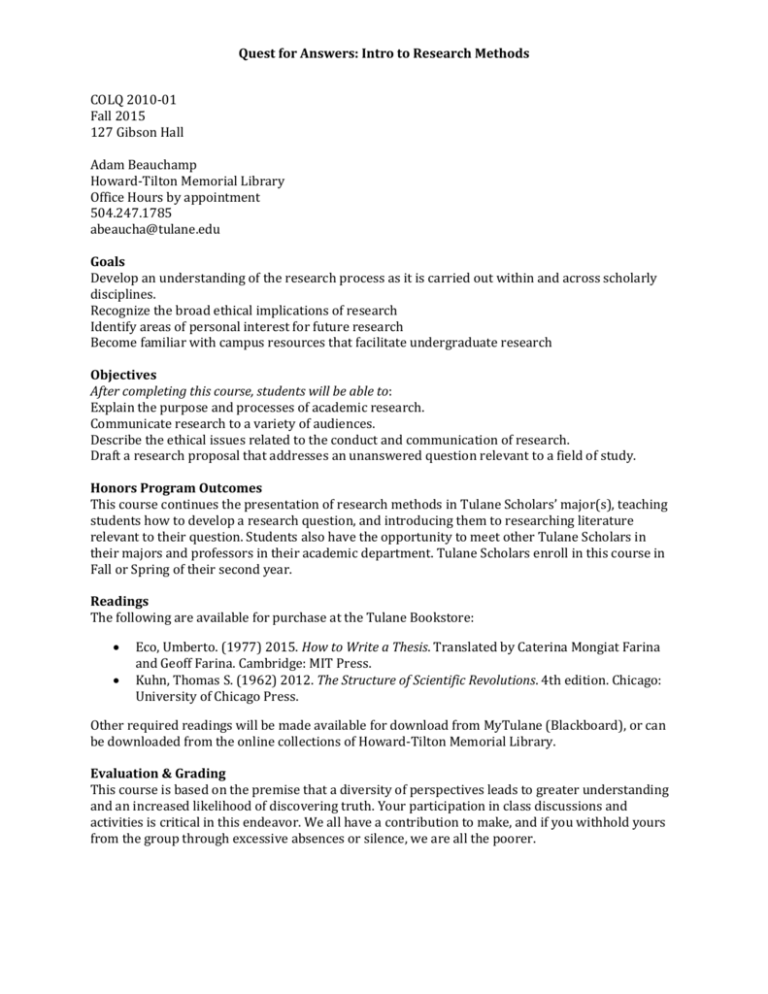
Quest for Answers: Intro to Research Methods COLQ 2010-01 Fall 2015 127 Gibson Hall Adam Beauchamp Howard-Tilton Memorial Library Office Hours by appointment 504.247.1785 abeaucha@tulane.edu Goals Develop an understanding of the research process as it is carried out within and across scholarly disciplines. Recognize the broad ethical implications of research Identify areas of personal interest for future research Become familiar with campus resources that facilitate undergraduate research Objectives After completing this course, students will be able to: Explain the purpose and processes of academic research. Communicate research to a variety of audiences. Describe the ethical issues related to the conduct and communication of research. Draft a research proposal that addresses an unanswered question relevant to a field of study. Honors Program Outcomes This course continues the presentation of research methods in Tulane Scholars’ major(s), teaching students how to develop a research question, and introducing them to researching literature relevant to their question. Students also have the opportunity to meet other Tulane Scholars in their majors and professors in their academic department. Tulane Scholars enroll in this course in Fall or Spring of their second year. Readings The following are available for purchase at the Tulane Bookstore: Eco, Umberto. (1977) 2015. How to Write a Thesis. Translated by Caterina Mongiat Farina and Geoff Farina. Cambridge: MIT Press. Kuhn, Thomas S. (1962) 2012. The Structure of Scientific Revolutions. 4th edition. Chicago: University of Chicago Press. Other required readings will be made available for download from MyTulane (Blackboard), or can be downloaded from the online collections of Howard-Tilton Memorial Library. Evaluation & Grading This course is based on the premise that a diversity of perspectives leads to greater understanding and an increased likelihood of discovering truth. Your participation in class discussions and activities is critical in this endeavor. We all have a contribution to make, and if you withhold yours from the group through excessive absences or silence, we are all the poorer. COLQ 2010-01 Page 2 Grade Breakdown Class participation in discussions & activities Interview assignment Communicating research First draft, research proposal Writing for the public Writing for funding Class presentation & participation Final research proposal (Final exam) 50% 10% 5% 5% 5% 10% 15% Due Date 10/6 10/13 10/29 11/12 11/17 – 11/24 12/15 Americans with Disabilities Act (ADA) for Students with Special Needs Any students with disabilities or other special needs, who need special accommodations in this course, are invited to share these concerns or requests with the instructor and contact Goldman Center for Disability Services: http://tulane.edu/studentaffairs/disability. Code of Academic Conduct The Code of Academic Conduct applies to all undergraduate students, full-time, and part-time, in Tulane University. Tulane University expects and requires behavior compatible with its high standards of scholarship. By accepting admission to the university, a student accepts its regulations (i.e., Code of Academic Conduct: http://tulane.edu/college/code.cfm, Code of Student Conduct: http://tulane.edu/studentaffairs/conduct/code.cfm) and acknowledges the right of the university to take disciplinary action, including suspension or expulsion, for conduct judged unsatisfactory or disruptive. One Wave Resources Tulane University recognizes the inherent dignity of all individuals and promotes respect for all people. As “One Wave,” Tulane is committed to providing an environment free of all forms of discrimination based on race, ethnicity, creed, religion, gender, gender identity and sexual orientation, as well as all forms of sexual harassment, including sexual assault, domestic and dating violence, and stalking. If you (or someone you know) has experienced or experiences discrimination, domestic violence, sexual assault or sexual harassment, know that you are not alone. Resources and support are available. Learn more at onewave.tulane.edu. Any and all of your communications on these matters will be treated as either “Strictly Confidential” or “Mostly Confidential” as explained in the chart below. Strictly Confidential Except in extreme circumstances, involving imminent danger to one’s self or others, nothing will be shared without your explicit permission. Counseling & Psychological Services (CAPS) | (504) 314-2277 Mostly Confidential Conversations are kept as confidential as possible, but information is shared with key staff members so the University can offer resources and accommodations and take action if necessary for safety reasons. Coordinator of Violence Prevention (504) 314-2161 Student Health Center (504) 865-5255 Sexual Aggression Peer Hotline and Education (SAPHE) | (504) 654-9543 Tulane University Police (TUPD) (504) 865-5911 Office of Institutional Equity (504) 862-8083 COLQ 2010-01 Page 3 Class Outline: Subject to change at the discretion of the instructor. Unit 1: What is Research? Week 1 8/25: Intro to Research 8/27: Intro to Research and the Scientific Method Read and be ready to discuss: Eco, Introductions, Chapters 1 & 7; Schwartz, “The importance of stupidity in scientific research.” Optional: Wikipedia, “Scientific Method” (https://en.wikipedia.org/wiki/Scientific_method) Week 2 9/1: Paradigms and Normal Science Read: Kuhn, Chapters 1-3. Optional reading: Kuhn, Chapters 4-5. 9/3: Discovery as Collective Endeavor Read: Kuhn, Chapter 6 (pp. 52-65); Restall, Chapter 1 (pp. 1-26) Unit 2: Disciplines & Scholarly Communities Week 3 9/8: Definitions of Discipline Read: Aldrich, Part 1 (Chapters 2-4, pp. 11-73) Assignment (due next class): 1. Identify a major scholarly association for your field of study/major. Explore their website. How is the association organized? Do they meet regularly? What happens at their meetings? 2. Identify a major scholarly journal for your discipline, perhaps published by the association you found. Browse the most recent issue. How is it organized? What kinds of studies are being published? Are there other types of content besides study articles? 9/10: Scholarly communities Read: Eco, Chapter 2 Assignment (due 10/6): Interview a professor. Details provided on handout. COLQ 2010-01 Page 4 Week 4: At the Library 9/15: Meet at Howard-Tilton, room 309 Read: Eco, Chapter 3 Assignment (due 9/24): Put together a preliminary bibliography of sources you have found. Instead of listing them alphabetically, group them in whatever way makes most sense to you. Try to map out specific debates surrounding your topic (e.g. areas of theoretical disagreement, methodological diversity). Label groups and annotate individual sources in whatever way helps you to organize and understand them. 9/17: Meet at Howard-Tilton, room 308 Read: Eco, Chapter 4 Bring laptop if you have one. Download Zotero plugins/connectors as needed. Assignment (due next class): Bring a print copy of a scholarly article (an original study—no review essays or book reviews) from your bibliography to class next time for an in-class activity. Week 5 9/22: Connecting the Dots Read: Hyland, “Academic attribution” 9/24: Developing a Research Question Due: Preliminary bibliography Review: Kuhn’s concept of Normal Science (Chapter 3), and Eco’s advice on choosing a topic (Chapter 2) Assignment (due 10/13): First draft of research proposal. Details provided on handout. Read: Eco, Chapter 5 “Writing the Thesis” to help you write you first draft. Unit 3: Methods & Ethics Week 6 9/29: What is Methodology? What are Methods? Read: Symonds and Gorard, “Death of Mixed Methods?”; Wallace, Chapter 1 Assignment: Consider the methods commonly used by the authors in your bibliography. Select the best methodology for the research question you’re working on, and be ready to discuss it next class. 10/1: Matching Methods to Research Questions Week 7 10/6: Interactive Methods: Interview, Focus Group, Survey, Participant Observation Due: Interview a professor write-up Read: Krosnick, et al., “The Future of Survey Research”; Seltzer, “The Myers-Brigg Personality Test is Bunk”; Grant, “Goodbye to MBTI” 10/8: Hazards of Statistical Methods Read: TBA COLQ 2010-01 Page 5 Week 8 10/13: No class meeting. Due: First draft of research proposal Upload to myTulane (Blackboard) by 6:00pm 10/15: Fall Break Week 9 10/20: Science & Society Read: Feyerabend, Part Two, §1-10 Assignment (due 10/29): Writing for the public 10/22: Researchers Face the Public Read: TBA Week 10 10/27: Ethics of Research with Human & Animal Subjects Read: Milgram, “Behavioral study of obedience”; Kramer et al., “Experimental evidence of massivescale emotional contagion through social networks”; Goel, “Facebook tinkers with users’ emotions in news feed experiment, stirring outcry.” 10/29: Ethics of Research continued Due: Writing for the public Read: Aschwanden, “Science Isn’t Broken” Week 11 11/3: TBA 11/5: Funding Research Guest instructor: Charlotte Maheu Vail (Honors Program) shares grant and scholarship opportunities, and leads discussion on how to write for funding organizations. Week 12 11/10: Supported research and publishing opportunities at Tulane Guest speaker: Gary Talarchek (CELT) 11/12: Best practices for presentations Due: Writing for grant funding Week 13 11/17: Conference presentations 1-4 11/19: Conference presentations 5-8 Week 14 11/24: Conference presentations 9-12 11/26: Thanksgiving Break COLQ 2010-01 Page 6 Week 15 12/1: Conference presentations 13-16 12/3: Class Debrief What is Research? Where do we go from here? COLQ 2010-01 Page 7 Course Bibliography Aldrich, John H., editor. 2014. Interdisciplinarity : Its Role in a Discipline-Based Academy : A Report. New York, NY: Oxford University Press. Aschwanden, Christie. 2015. “Science Isn’t Broken.” FiveThirtyEight. August 19. http://fivethirtyeight.com/features/science-isnt-broken/. Goel, Vindu. 2014. “Facebook Tinkers With Users’ Emotions in News Feed Experiment, Stirring Outcry.” The New York Times, June 29. http://www.nytimes.com/2014/06/30/technology/facebook-tinkers-with-usersemotions-in-news-feed-experiment-stirring-outcry.html. Eco, Umberto. (1977) 2015. How to Write a Thesis. Translated by Caterina Mongiat Farina and Geoff Farina. Cambridge: MIT Press. Feyerabend, Paul. 1978. Science in a Free Society. London: NLB. Grant, Adam. 2013. “Goodbye to MBTI, the Fad That Won’t Die.” Psychology Today. September 18. http://www.psychologytoday.com/blog/give-and-take/201309/goodbye-mbti-the-fadwon-t-die. Hyland, Ken. 2004. Disciplinary Discourses: Social Interactions in Academic Writing. Ann Arbor: University of Michigan Press. Kramer, Adam D. I., Jamie E. Guillory, and Jeffrey T. Hancock. 2014. “Experimental Evidence of Massive-Scale Emotional Contagion through Social Networks.” Proceedings of the National Academy of Sciences 111 (24): 8788–90. doi:10.1073/pnas.1320040111. Krosnick, Jon A., Stanley Presser, Kaye Husbands Fealing, and Steven Ruggles. 2015. “The Future of Survey Research: Challenges and Opportunities.” National Science Foundation. http://www.nsf.gov/sbe/AC_Materials/The_Future_of_Survey_Research.pdf. Kuhn, Thomas S. (1962) 2012. The Structure of Scientific Revolutions. 4th edition. Chicago, IL: University of Chicago Press. Milgram, Stanley. 1963. “Behavioral Study of Obedience.” The Journal of Abnormal and Social Psychology 67 (4): 371–78. doi:10.1037/h0040525. Reardon, Sara. 2015. “US Vaccine Researcher Sentenced to Prison for Fraud.” Nature 523 (7559): 138–39. doi:10.1038/nature.2015.17660. Restall, Matthew. 2003. Seven Myths of the Spanish Conquest. New York: Oxford University Press. Schwartz, Martin A. 2008. “The Importance of Stupidity in Scientific Research.” Journal of Cell Science 121 (11): 1771–1771. doi:10.1242/jcs.033340. Seltzer, Sarah. 2015. “The Myers-Briggs Personality Test Is Bunk But I Don’t Care.” WIRED. May 30. http://www.wired.com/2015/05/the-myers-brigg-personality-test-is-bunk-but-i-dontcare/. Wallace, Walter L. 1971. The Logic of Science in Sociology. Chicago, Aldine Atherton. Wikipedia. (n.d.). “Scientific Method.” Available at https://en.wikipedia.org/wiki/Scientific_method. Accessed 8 August 2015. COLQ 2010-01 Page 8 COLQ 2010-01 Page 9 Tear off this page. Name: ______________________________________________________________________________ In the space below, respond to the following: What is research? Based on any past experience, describe your experience with the research process (e.g. how you felt, how you managed it, etc.).
